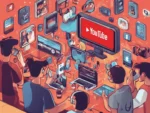
Digital Marketing vs. Social Media Marketing: Understanding the Overlap and Differences
Digital marketing and social media marketing are often confused, but they’re not the same thing. Here’s what you need to know:
- Digital marketing is the big umbrella covering all online marketing efforts
- Social media marketing is just one piece of digital marketing, focused on social platforms
Key differences:
- Scope: Digital marketing covers all online channels, social media marketing only social platforms
- Goals: Digital marketing aims to boost overall online presence, social media marketing builds relationships
- Tools: Digital marketing uses SEO tools and analytics, social media marketing uses posting and engagement tools
Where they connect:
- Both need great content
- Both use paid advertising
- Both aim to connect with customers
- Both rely on data to make decisions
Quick Comparison:
| Aspect | Digital Marketing | Social Media Marketing |
| Channels | Websites, search engines, email, apps | Social media platforms |
| Primary goals | Boost online presence, convert clicks | Build relationships, increase engagement |
| Key metrics | Website traffic, conversion rates, ROI | Follower growth, engagement rates, brand mentions |
| Skills needed | SEO, data analysis, content creation | Community management, platform expertise, content creation |

Bottom line: Both strategies are crucial for a strong online presence. Use them together for best results.
Digital Vs Social Media Differences
What Digital Marketing and Social Media Marketing Mean
Let’s break them down and see how they work together.
What is Digital Marketing?
Digital marketing is about using digital channels to reach and engage your audience. This includes:
- SEO
- PPC advertising
- Email campaigns
- Content marketing
- Social media marketing
It’s your entire online presence. How you get found on Google, nurture leads through email, and create content that attracts customers.
Landingi, a landing page builder, uses various digital marketing channels. They focus on driving traffic to their website through SEO and paid ads on Google’s search network. This approach helps them reach potential customers at different stages of their journey.
What is Social Media Marketing?
Social media marketing is one piece of the digital marketing puzzle. It’s about using social platforms to connect with your audience, build your brand, and drive sales. This includes:
- Creating and sharing content on platforms like Facebook, Instagram, and LinkedIn
- Engaging with followers and building a community
- Running social media ad campaigns
- Working with influencers
The goal? Get people talking about your brand and drive more business.
Apple’s #ShotoniPhone campaign is a great example. They encouraged users to share photos taken with their iPhone 6. The result? 6.5 billion media impressions and 231 million iPhone 6 models sold. That’s social media marketing in action.
How They Work Together
Digital marketing and social media marketing aren’t separate entities. They’re best friends who work well together.
Your social media efforts feed into your broader digital marketing strategy:
- Blog content (digital marketing) can be shared on social media
- Social media engagement can drive traffic back to your website
- Data from social media campaigns can inform your overall digital marketing strategy
Red Bull’s Stratos project shows this synergy. They sponsored a skydive from the edge of space and shared it across digital platforms. It became one of the best digital marketing campaigns ever, with social media playing a crucial role.
Effective marketing isn’t about choosing between digital and social media marketing. It’s about using both strategically to reach your goals. As Jay Baer, Founder of Convince & Convert, says:
“The best social media strategic plans are tool-agnostic and set forth objectives and metrics that supersede any particular social venue.”
Whether you’re a small business owner or a marketing pro, understanding how these two work together is key to creating a powerful online presence.

Main Differences Between the Two
Where They Operate
Digital marketing uses websites, search engines, emails, and apps. Whereas Social media marketing is usually focused in just one sphere social platforms like Facebook and Instagram.
Think about Airbnb. They use SEO, Google Ads, and emails to catch potential hosts – that’s digital marketing. But they also show off dreamy properties on Instagram – hello, social media marketing!
Overwhelmed by Digital Marketing?
Just released: my new book to help small businesses, entrepreneurs, and marketers master digital marketing in today’s digital-first world.
Drawing on my Fractional CMO experience, Digital Threads simplifies complex strategies into clear, actionable steps for success.
Transform your business today—grab your copy! Click the cover or button below to buy on Amazon.
What They Try to Achieve
Digital marketing is all about boosting your online presence and turning clicks into customers. It’s the online equivalent of a billboard, a salesperson, and a customer service rep rolled into one.
Social media marketing? It’s more like hosting a party. It’s about building relationships and getting people talking.
Look at Glossier. Their website and emails are primed to sell beauty products. But on Instagram, they’re building a community. They share customer photos and chat with followers. It’s less “Buy now!” and more “Hey, come hang out with us!”
Tools They Use
These cousins don’t share the same toolbox:
Digital marketing uses SEO tools like SEMrush, email platforms like Mailchimp, and Google Analytics.
Social media marketing prefers tools like Hootsuite for posting, Sprout Social for listening, and AspireIQ for working with influencers.
Further Reading: Share of Voice vs. Share of Market: What’s the Difference and Why It Matters?
How Success is Measured
Success looks different for each:
| Digital Marketing Metrics | Social Media Marketing Metrics |
| Website traffic | Follower growth |
| Conversion rates | Engagement rates |
| Email open rates | Reach and impressions |
| ROI | Brand mentions |
Take Spotify. For digital marketing, they’re counting new sign-ups. But for social media? They’re watching how many people share their “Wrapped” campaign or tag friends in playlist posts.
Where They Connect
Digital marketing and social media marketing aren’t as separate as you might think. They actually have a lot in common. Let’s look at where these two online promotion powerhouses overlap:
Content Creation and Use
Both strategies need great content to grab people’s attention. The main difference? How they spread that content around.
Take Airbnb, for example. They turn their website travel guides into eye-catching Instagram posts. This clever move boosts engagement on social media while promoting their main digital content.
Paid Advertising
Ads are a big deal in both digital and social media marketing. Digital marketers might use Google Ads to show up in search results. Social media folks, on the other hand, use tools like Facebook Ads Manager.
Spotify’s a pro at this. They use Google Ads to find people searching for music streaming. At the same time, they run Instagram ads showing off user-made playlists. It’s a smart way to tap into the social side of sharing music.
Connecting with Customers
Both strategies want to build real relationships with their audience. Digital marketing might use emails or chatbots. Social media marketing focuses on comments, direct messages, and content from users.
Glossier, the beauty brand, does this really well. They send emails about new products and deals (that’s digital marketing). But they also chat with customers through Instagram comments and stories (hello, social media marketing).
Further Reading: Why Hiring a Digital Marketing Expert Could Be the Game-Changer Your Business Needs
Using Data to Make Decisions
Both digital and social media marketers LOVE data. Digital marketers look at website traffic and how many people buy stuff. Social media marketers care about likes, shares, and how many followers they’re getting.
“In today’s digital landscape, social media has become an indispensable tool for businesses looking to thrive and succeed.”
This quote shows why it’s so important to mix social media data with bigger digital marketing plans. For example, if lots of people suddenly start talking about a product on social media, that could change email campaigns or what goes on the website.
HubSpot’s a great example of this. They work with tools like Sprout Social to help marketers create content, keep an eye on what’s happening, and fix customer problems across both digital and social channels. It gives a full picture of how customers are interacting with the brand.
How to Put Both into Action
Let’s get your online presence buzzing. Here’s how to make digital and social media marketing work together.
Setting Up Digital Marketing
Building a solid digital marketing plan is like cooking a great meal. You need the right ingredients:
1. Set clear goals
What’s your endgame? More website visits? Higher sales? Get specific.
2. Know your audience
Who are your customers? What makes them tick? Where do they hang out online?
3. Create a content strategy
Plan content that’ll grab your audience. Think blog posts, videos, the works.
4. Optimize for search engines
Use SEO tools to find what your audience is searching for.
5. Set up email marketing
Keep your leads warm and your customers engaged with email campaigns.
Here’s a fun fact: 53% of website traffic comes from organic search. So, your SEO game needs to be on point!
Setting Up Social Media Marketing
Social media isn’t just about cute cat videos (though they help). Here’s your playbook:
1. Choose your platforms
Don’t spread yourself thin. Pick platforms where your audience hangs out.
2. Create a content calendar
Plan your posts ahead. Scheduling tools can be a lifesaver here.
3. Engage with your audience
Social media is a conversation, not a monologue. Respond to comments and messages.
4. Use visuals
Posts with images get 2.3 times more engagement. Make your graphics pop.
5. Track your performance
Use analytics to see what’s working and what’s not.
Making Them Work Together
This is where the magic happens. I suggest the following:
- Share your blog posts on social media
- Use social media insights for blog ideas
- Retarget social media followers with ads
- Use social proof in your digital marketing
- Leverage user-generated content
Budget and Time Planning
Wondering how to split your resources? Here’s a rough guide:

| Marketing Type | Budget % | Time % |
| Digital Marketing | 60-70% | 50-60% |
| Social Media Marketing | 30-40% | 40-50% |
But remember, these are just guidelines. Adjust based on what works for your business.
Want inspiration? Look at Chipotle’s TikTok success. Their #GuacDance challenge got 250K submissions and 430M views in just six days. The result? 800K guac sales on National Guacamole Day. That’s the kind of impact you’re aiming for!
Skills Needed for Each Job
Digital marketing and social media marketing need different skills, but there’s some overlap. Here’s what you need to succeed in each:
Digital Marketing Skills
To rock digital marketing, you’ll need:
- Data analysis skills
- SEO know-how
- Content creation chops
- Email marketing expertise
- Customer acquisition strategies
Michael Page says, “Have basic knowledge of every skill with specializations in a few.” This lets you see the big picture while being a pro in specific areas.
Social Media Marketing Skills
Social media marketers need:
- Content creation skills
- Community management expertise
- Influencer outreach abilities
- Platform-specific knowledge
- Analytics understanding
Required Tools and Platforms
Both fields use various tools:
| Digital Marketing Tools | Social Media Marketing Tools |
| Google Analytics | Sendible |
| SEMrush | Brand 24 |
| ActiveCampaign | Adobe Express |
| Ahrefs | SocialBee |
| Klaviyo | Social Pilot |
Career Options
Choosing between digital and social media marketing? Here’s a quick comparison:
| Aspect | Digital Marketing | Social Media Marketing |
| Scope | All online channels | Social media platforms |
| Skills | Technical, data-driven | Creative, community-focused |
| Salary | Higher on average | Competitive, generally lower |
| Growth | 52% job growth expected | High demand, especially for video |
Digital marketing might be your thing if you like working with different channels and have a thing for data. If you’re creative and love chatting with people online, social media marketing could be your jam.
Meghan Keaney Anderson from Jasper says, “We really look for people with their finger on the pulse of how social is changing. It is one of the most rapidly changing industries right now, and I want someone who is paying attention to it, who is enthralled by it and fascinated by it.”
No matter which path you pick, stay curious and keep learning. The digital world moves fast!
Conclusion
Digital marketing and social media marketing are two powerhouses that can skyrocket your business online. Here’s the lowdown:
Digital marketing? It’s the big picture. We’re talking SEO, email campaigns, paid ads – the works. It’s all about reaching potential customers wherever they hang out online.
Social media marketing? That’s the cool kid on the block. It’s laser-focused on platforms like Facebook, Instagram, and Twitter. It’s where you build your brand and chat directly with your audience.
Let’s talk numbers:
- 4.9 billion people use social media. That’s a LOT of potential customers.
- For every buck spent on digital marketing, companies make $44 back. Not too shabby.
- 86% of marketers say social media boosts their brand and website traffic.

These stats? They’re screaming “use both strategies!”
Now, let’s look at some real-world wins:
Airbnb killed it with user-generated content on social media. They got travelers to share their experiences with specific hashtags. Result? Their brand image soared and they grew like crazy.
Apple’s #ShotoniPhone campaign? Pure genius. They asked users to share photos taken with their iPhone 6. The outcome? 6.5 billion media impressions and 231 million iPhone 6 models sold worldwide.
These examples show how social media can supercharge your digital marketing efforts.
Want to make both work for you? Here’s how:
1. Create a digital marketing strategy with social media as a key player.
2. Use social media insights to shape your broader digital marketing. Think content creation and SEO strategies.
3. Use social media’s interactive nature to build deeper connections with your audience. Then nurture these connections through other digital channels.
It’s not about picking sides. It’s about using both digital and social media marketing to create a killer online presence that drives growth and engagement.
In this digital age, businesses that can effectively blend these two approaches will come out on top. Understand their unique strengths, see how they complement each other, and watch your business soar.










